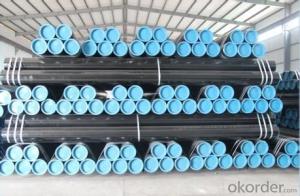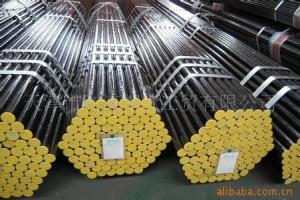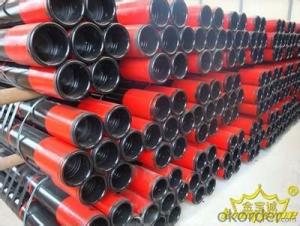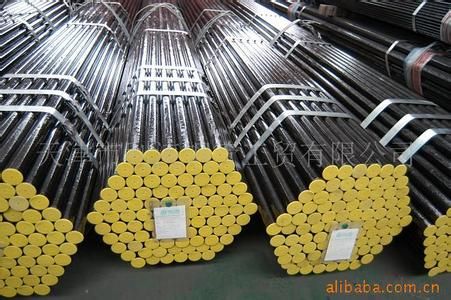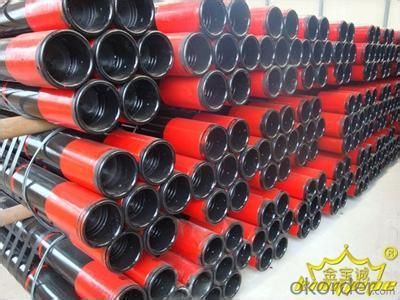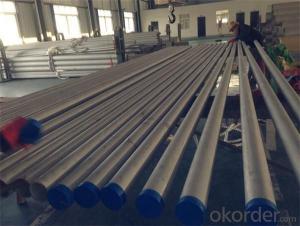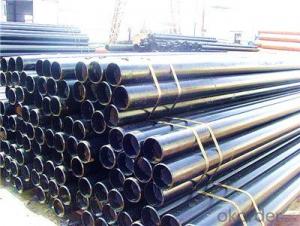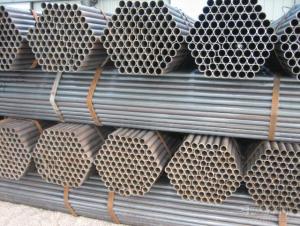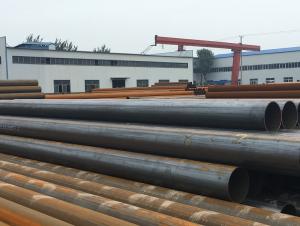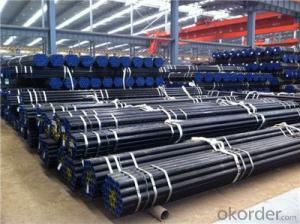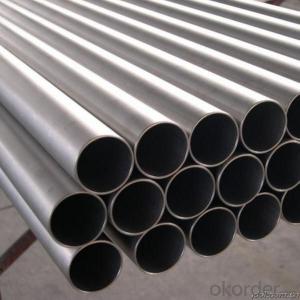Hot sell CS Seamless Pipe with High Quality and Best Price
- Loading Port:
- Tianjin
- Payment Terms:
- TT OR LC
- Min Order Qty:
- 10 m.t.
- Supply Capability:
- 9000 m.t./month
OKorder Service Pledge
OKorder Financial Service
You Might Also Like
Product Description:
1、Structure of CS Seamless Pipe Description:
CS Seamless pipe is formed by drawing a solid billet over a piercing rod to create the hollow shell. As the manufacturing process does not include any welding, seamless pipes are perceived to be stronger and more reliable. Historically seamless pipe was regarded as withstanding pressure better than other types, and was often more easily available than welded pipe.
2、Main Features of the CS Seamless Pipe:
• High manufacturing accuracy
• High strength
• Small inertia resistance
• Strong heat dissipation ability
• Good visual effect
• Reasonable price
3、CS Seamless Pipe Images:
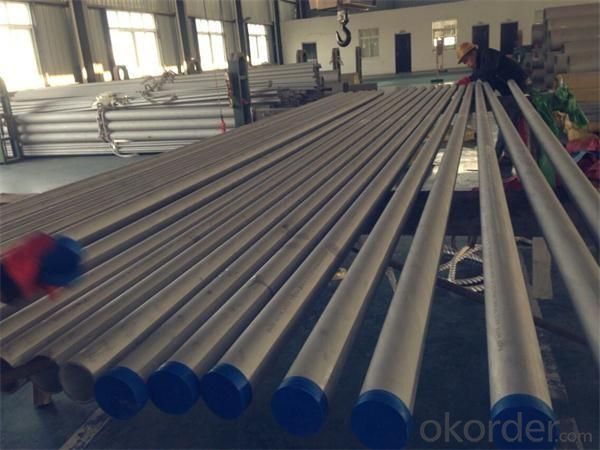
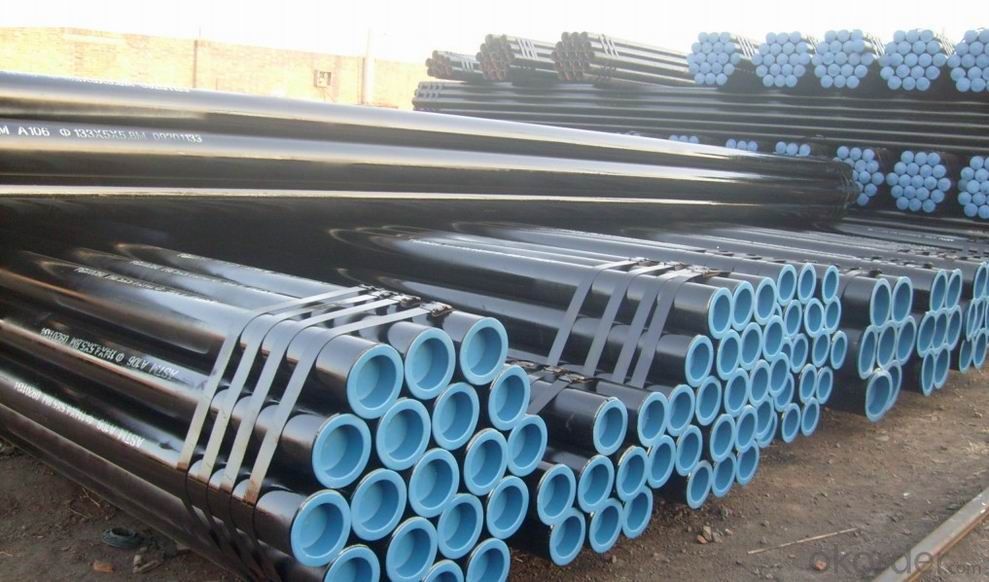
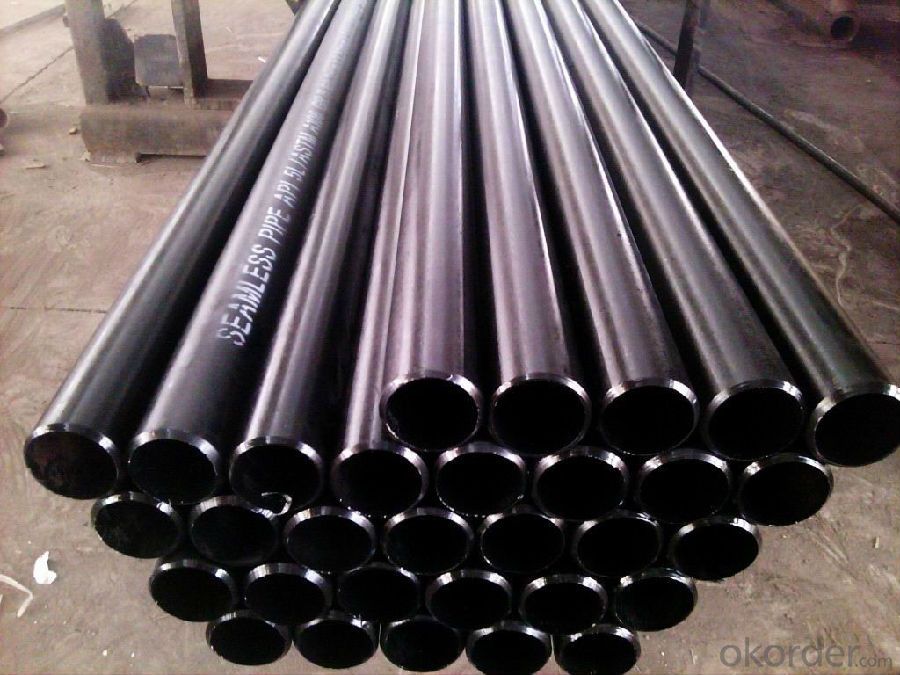
Packaging & Delivery
| Packaging Details: | seaworthy package, bundles wrapped with strong steel strip |
| Delivery Details: | 15-30 days after received 30% TT |
4、CS Seamless Pipe Specification:
| Standard: | GB, DIN, AST ASTM A106-2006, ASTM A53-2007M |
| Grade: | 10#-45#, 16Mn 10#, 20#, 45#, 16Mn |
| Thickness: | 2 - 50 mm |
| Section Shape: | Round |
| Outer Diameter: | 21.3 - 620 mm |
| Secondary Or Not: | Non-secondary |
| Application: | Hydraulic Pipe |
| Technique: | Hot Rolled |
| Certification: | API |
| Surface Treatment: | factory state or painted black |
| Special Pipe: | Thick Wall Pipe |
| Alloy Or Not: | Non-alloy |
| Length: | 5-12M |
1.Name:seamless steel pipe
2.Material:20#(ASTM A 106/A53 GRB.API5LGRB,GB),45#,16Mn,10#.
3.Specification range:OD:21.3-610mm,WT:6-70mm,length:6-12m or according to the requirement of clients.
4.Excutive standards:GB,ASME API5L.ASTM A 106/A53,Despite of the above standards,we can also supply seamless steel pipe with standard of DIN,JIS,and so on,and also develop new products according to the requirements of our clients!
5.Surface:black lacquered,varnish coating or galvanized.
6.Ends:Beveled or square cut,plastic capped,painted.
7.Application:seamless steel pipe for low and medium pressure boiler,high pressure boiler and ship-building,liquid service,petroleum cracking,chemical fertilizer equipment,drawing-oil-equipment and structure purpose!
8.Packing:bundles wrapped with strong steel strip,seaworthy packing.
5、FAQ of CS Seamless Pipe:
①How is the quality of your products?
Our products are manufactured strictly according to national and internaional standard, and we take a test
on every pipe before delivered out. If you want see our quality certifications and all kinds of testing report, please just ask us for it.
Guaranteed: If products’ quality don’t accord to discription as we give or the promise before you place order, we promise 100% refund.
②How about price?
Yes, we are factory and be able to give you lowest price below market one, and we have a policy that “ for saving time and absolutely honest business attitude, we quote as lowest as possible for any customer, and discount can be given according to quantity”,if you like bargain and factory price is not low enough as you think, just don’t waste your time.Please trust the quotation we would give you, it is professional one.
③Why should you chose us?
Chose happens because of quality, then price, We can give you both.Additionally, we can also offer professional products inquiry, products knowledge train(for agents), smooth goods delivery, exellent customer solution proposals.Our service formula: good quality+good price+good service=customer’s trust
SGS test is available, customer inspection before shipping is welcome, third party inspection is no problem.
Any question, pls feel free to contact us !
- Q: What are the common protective coatings used on the inner surface of steel pipes?
- The common protective coatings used on the inner surface of steel pipes include epoxy, polyurethane, and cement mortar coatings. These coatings provide corrosion resistance, prevent the formation of scales, and improve the durability and lifespan of the pipes.
- Q: How are steel pipes used in the construction of buildings?
- Steel pipes are commonly used in the construction of buildings for various purposes. They are primarily used for structural support, providing stability and strength to the overall framework. Steel pipes are also used for plumbing systems, carrying water and other fluids throughout the building. Additionally, they are used for HVAC (heating, ventilation, and air conditioning) systems, allowing for efficient distribution of air. Overall, steel pipes play a crucial role in ensuring the durability, functionality, and safety of buildings.
- Q: What are the different methods of pipe threading for steel pipes?
- The different methods of pipe threading for steel pipes include manual threading, machine threading, and electric threading. Manual threading involves using a handheld die or tap to create the threads on the pipe. Machine threading utilizes power-driven machines that can thread multiple pipes simultaneously, offering efficiency and accuracy. Electric threading is similar to machine threading, but it uses an electric motor to drive the threading process.
- Q: How are steel pipes inspected for defects?
- Steel pipes are inspected for defects using various methods, including visual inspection, ultrasonic testing, magnetic particle inspection, dye penetrant testing, and radiographic examination. These techniques help identify any cracks, corrosion, or other defects in the pipes to ensure their structural integrity and prevent any potential hazards or failures.
- Q: How are steel pipes used in offshore drilling platforms?
- Steel pipes are used in offshore drilling platforms to transport drilling fluids, such as mud and cement, from the drilling rig to the wellbore. These pipes are also used to extract oil and gas from the well by connecting the drilling rig to the subsea wellhead. Additionally, steel pipes provide structural support and stability to the drilling platform, ensuring safe and efficient operations in harsh offshore environments.
- Q: What is the difference between cast iron and steel pipes?
- The main difference between cast iron and steel pipes lies in their composition and manufacturing process. Cast iron pipes are made from a strong, durable material that consists primarily of iron, carbon, and silicon. They are cast in molds and have a thick, heavy wall. Steel pipes, on the other hand, are made from an alloy of iron and carbon, usually with smaller amounts of other elements. They are manufactured using various methods, such as seamless or welded, and can have different wall thicknesses depending on their intended use. In summary, cast iron pipes are heavier and more brittle, while steel pipes are lighter and more flexible, making them suitable for different applications.
- Q: How do you calculate the thermal expansion of steel pipes?
- To calculate the thermal expansion of steel pipes, you need to know the coefficient of thermal expansion (CTE) of the specific type of steel used. This value represents how much the steel material expands or contracts per unit length with each degree of temperature change. Once you have the CTE, you can multiply it by the initial length of the steel pipe and the temperature change to determine the thermal expansion. The formula is: Thermal Expansion = CTE x Initial Length x Temperature Change.
- Q: Can steel pipes be used for underground drainage systems?
- Yes, steel pipes can be used for underground drainage systems. Steel pipes are durable, strong, and resistant to corrosion, making them a suitable choice for underground applications. They can effectively handle the flow of water and withstand the pressure of soil and external elements. However, it is important to ensure proper insulation and anti-corrosion measures are in place to protect the steel pipes from potential damage caused by moisture and chemical reactions.
- Q: How are steel pipes insulated to prevent condensation?
- Steel pipes are insulated to prevent condensation by wrapping them with a layer of insulation material, such as foam or fiberglass, which creates a barrier between the cold surface of the pipe and the surrounding air. This insulation helps to maintain the temperature of the pipe, preventing it from reaching the dew point and thus avoiding condensation.
- Q: What are the advantages of using steel pipes over other materials like PVC or copper?
- There are several advantages of using steel pipes over other materials like PVC or copper. Firstly, steel pipes are extremely durable and can withstand high pressure and extreme temperatures, making them ideal for various applications including industrial and underground use. Secondly, steel pipes have a longer lifespan compared to PVC or copper, reducing the need for frequent replacements and maintenance. Additionally, steel pipes are more resistant to corrosion and are not prone to cracking or leaking, ensuring a reliable and leak-free plumbing system. Lastly, steel pipes have a higher fire resistance rating compared to PVC, making them a safer option for certain environments.
Send your message to us
Hot sell CS Seamless Pipe with High Quality and Best Price
- Loading Port:
- Tianjin
- Payment Terms:
- TT OR LC
- Min Order Qty:
- 10 m.t.
- Supply Capability:
- 9000 m.t./month
OKorder Service Pledge
OKorder Financial Service
Similar products
Hot products
Hot Searches
Related keywords
